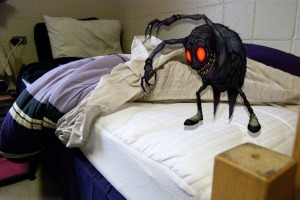Small parasitic insects that feed on human blood, sounds like something you would only hear in a horror movie. But these pests are real and have been given the name bed bugs, for the sole fact that they manifest in your bed and feed off of their host.
The Office of Residence Life and Student Health and Counseling posted a flyer up around campus called “Bed Bugs 101” during the spring semester. The fliers included the main facts students must know about bed bugs, how to manage them and what to do if a student finds bed bugs or was bitten.
Simple precautions can help prevent this nightmare from happening to students. It only takes one bed bug to latch onto a student’s clothing until their bed and room is infested. In places like dorm buildings, it is likely that once one room is infested then the insects can move from one room to another. This is also true with hospitals, hotels, apartment buildings and shelters, the common trend being the close living conditions.
Although C.W Post had a bed bug scare this semester there was no press release or other information about the scare to inform students, other than the fliers that appeared in the dorms. “I’ve heard about the scare through friends but it’s not really a worry to me. I clean my sheets often and keep clean so I do my part to try and prevent it,” said Jimmy Bare a sophomore. Although hygiene has little to do with preventing bed bugs it doesn’t hurt to wash your sheets often.
“Out of our 1,600-bed capacity, we have encountered a limited number of cases. The Division for Student Affairs and the Facilities Services department remain proactive and committed to the safety and well-being of our students,” said Amy Urquhart the Assistant Provost for Student Affairs.
Post is not the only school to have had bed bug scares this semester. Recently Adelphi University had to treat a dorm room after three students complained for five days about the bed bugs. Hofstra, another local university also had a bed bug scare; two dorm rooms were treated for the nocturnal biting insects.
“Everyone should defiantly be alerted, especially because it’s concerning our health and safety. Students who complain about bed bugs should have their rooms inspected and new beds ordered,” said Tatiana Lampa a sophomore living on campus.
The Infirmary will not release any information about the scare on campus but they did confirm that students have been arriving with complaints and concerns of what look like bed bug bites on their skin.
Just using chemical treatments will not get rid of the infestation, so contact the Student Health Center at (516)299-2345 if you have any concerns or feel that bed bugs have hitchhiked their way into your dorm. To prevent bed bugs, try sealing your mattress and pillows with a plastic zip cover. It’s been said that adult bed bugs can survive for over twelve months when feeding off their hosts, so the plastic zip cover can help trap and eventually kill bugs before they reach your skin. When checking to see if your bed has been infected, look in areas that are dark; for instance in your beds creases and seams. Bed bugs like to be hidden, which is why they mainly feed at night when you’re sleeping. To avoid this nightmare from happening to you, follow all precautions to stay clear of bed bugs.







Be First to Comment